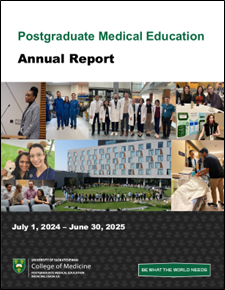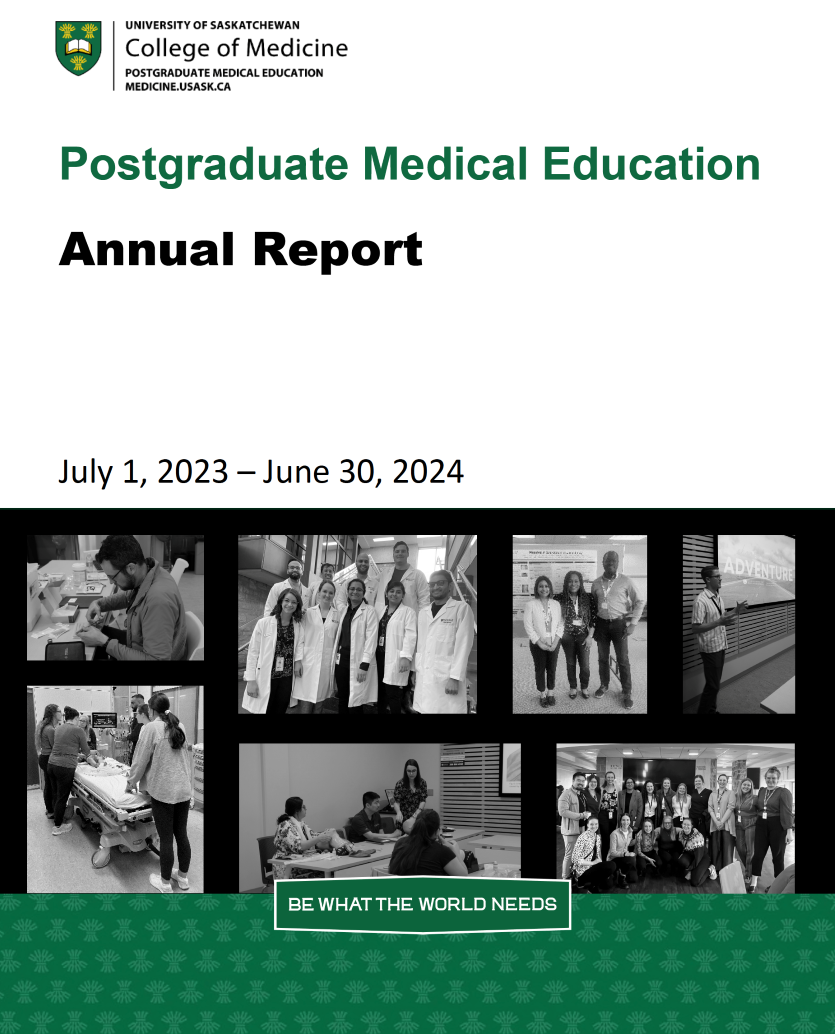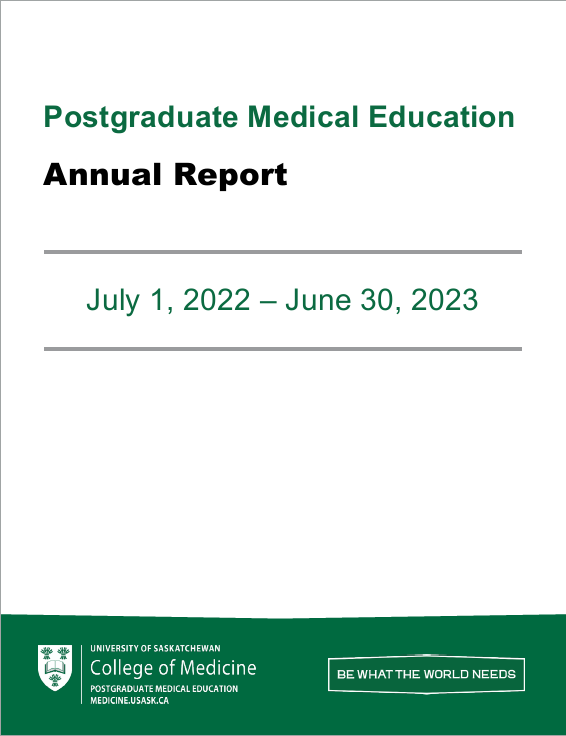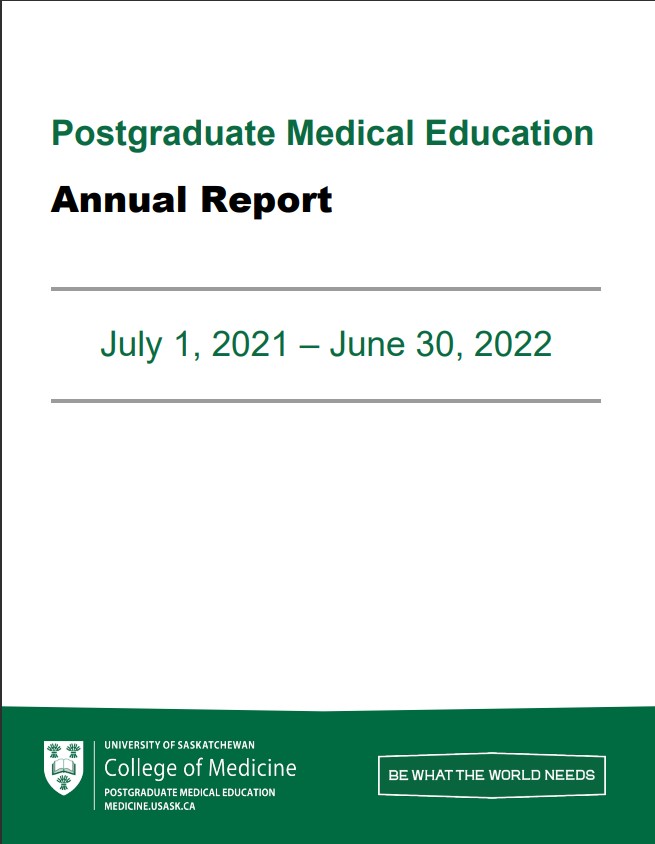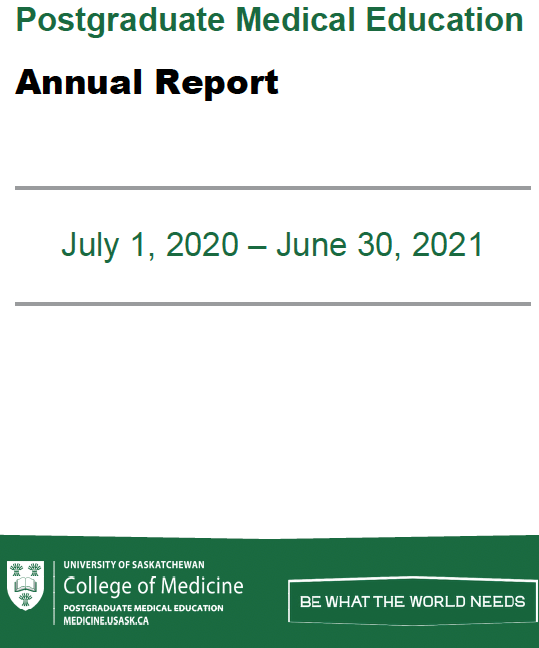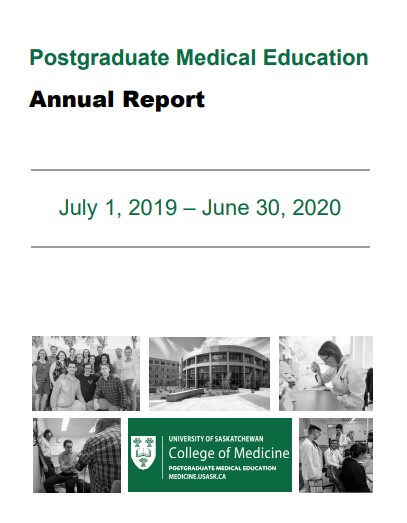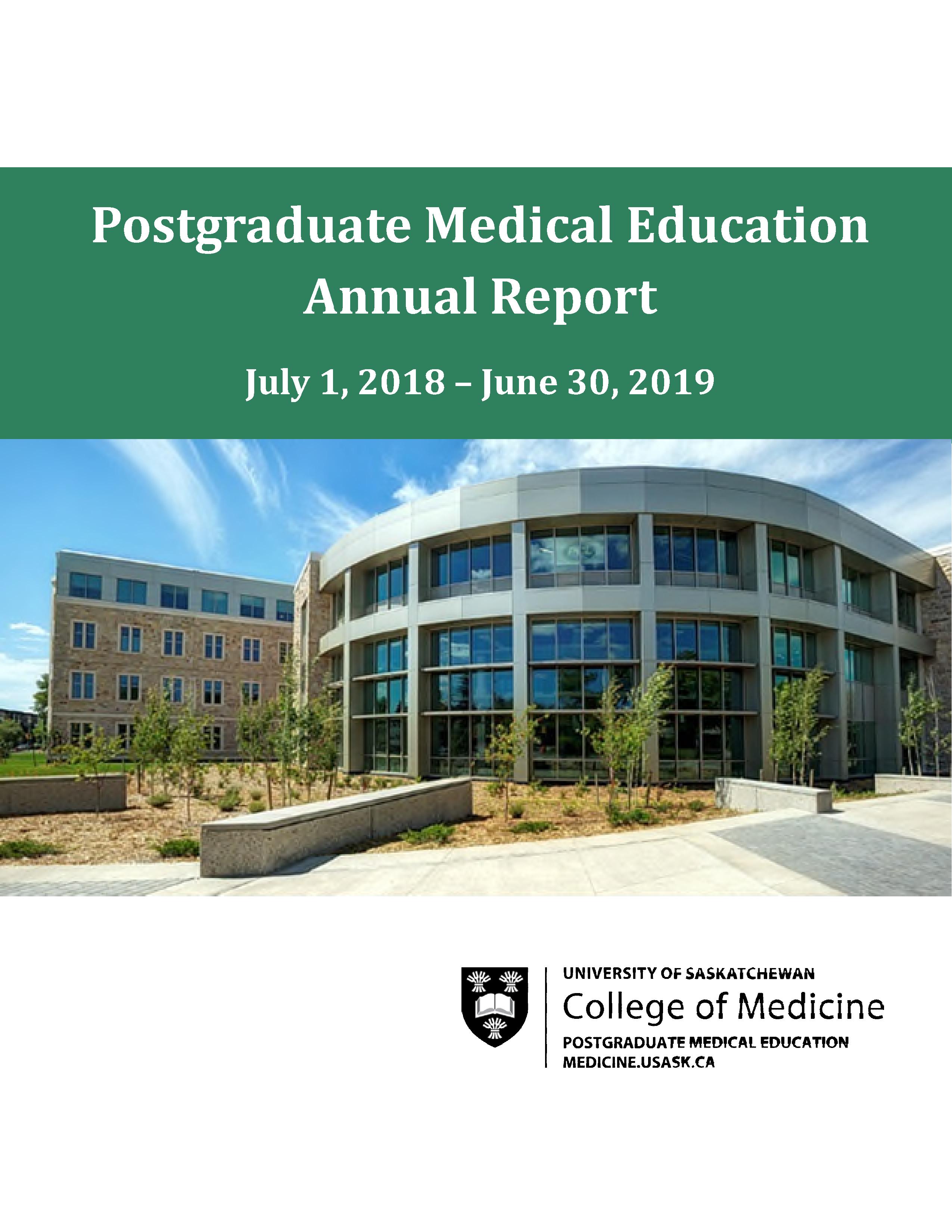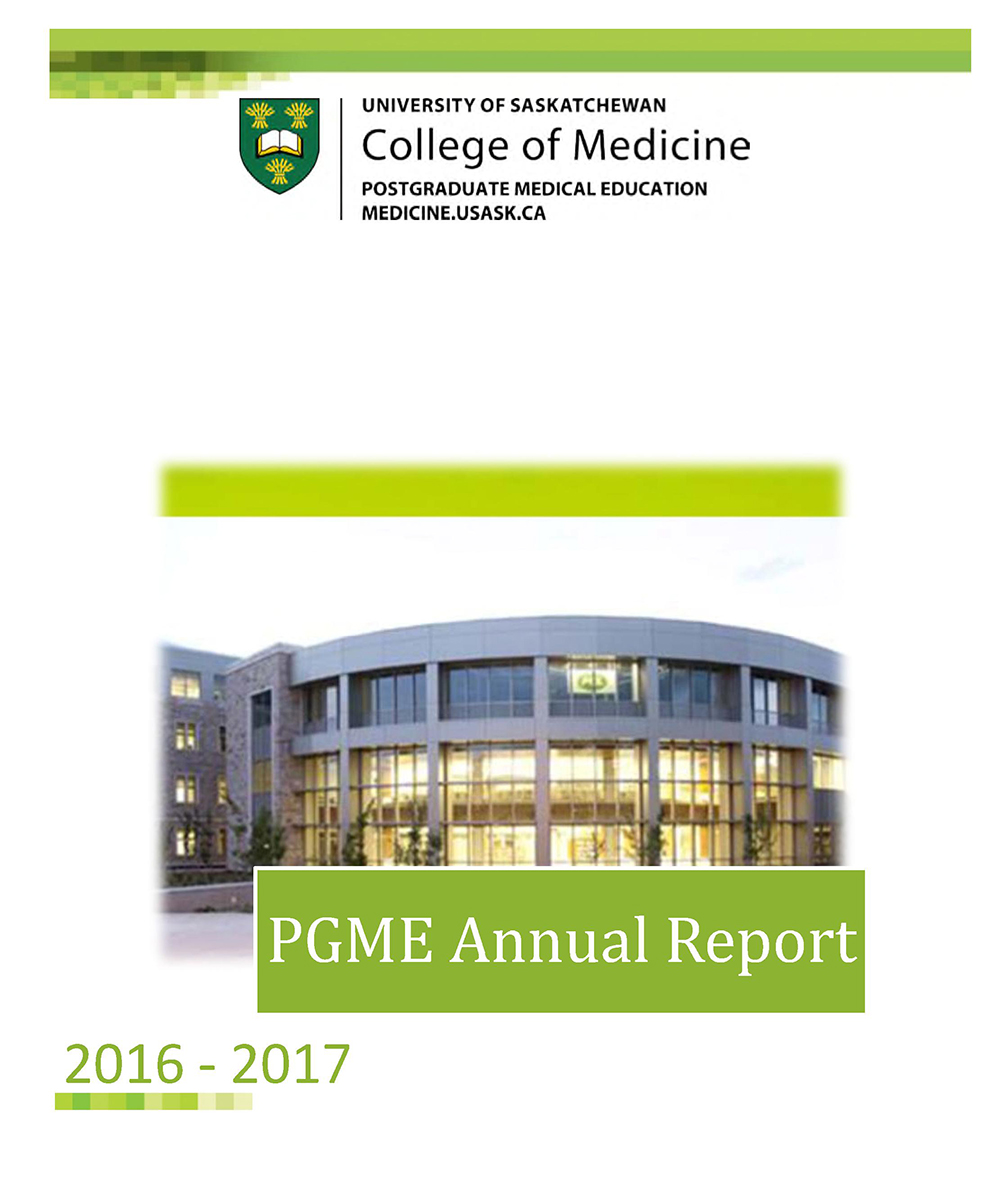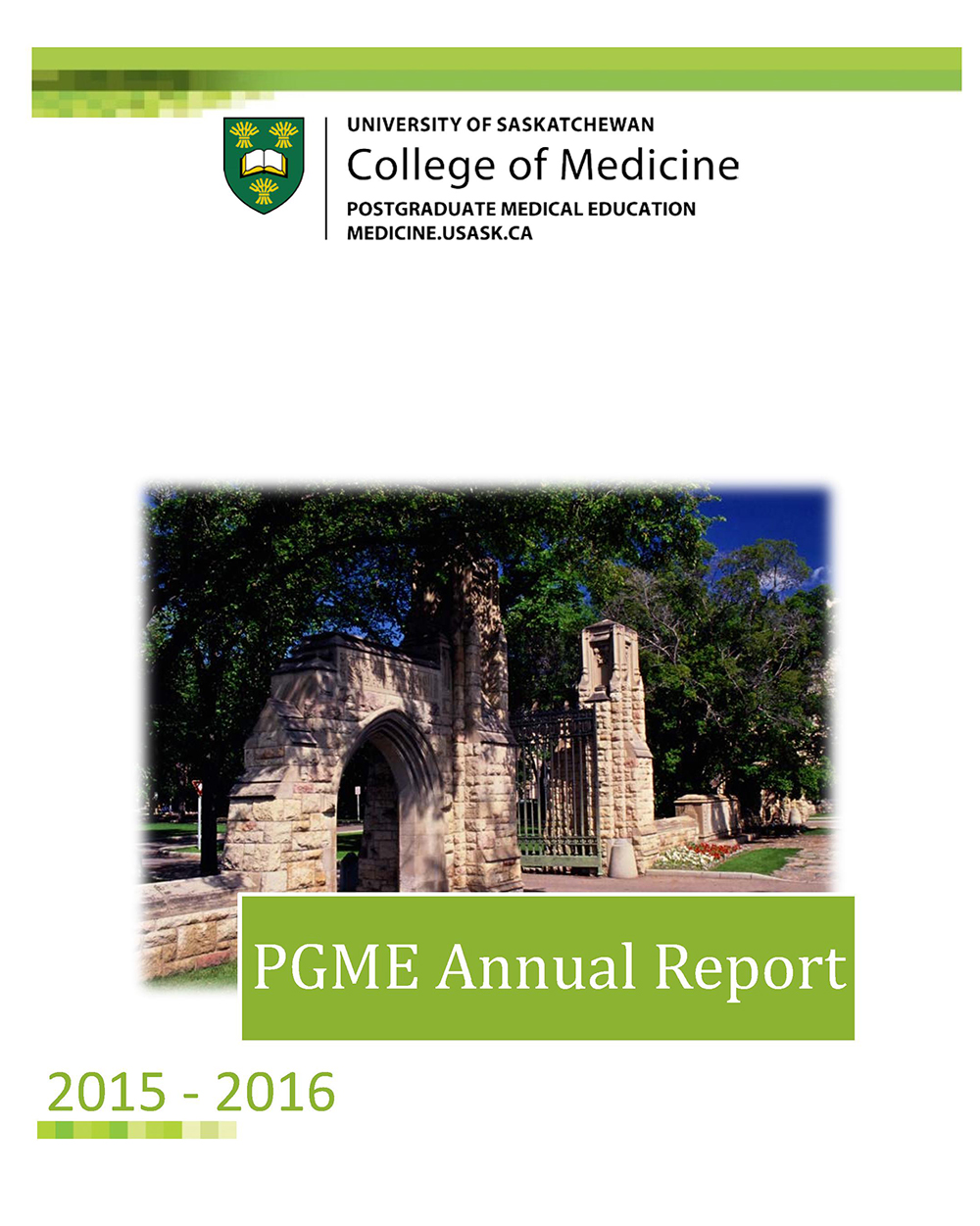Postgraduate Medical Education Office
The Postgraduate Medical Education office (PGME) is committed to working with residents to ensure that their educational experience during the time they spend at the University of Saskatchewan will provide them with the best possible program to meet their needs in relation to their future career goals. The role of the PGME office is one of coordination - with residents, with teaching hospitals, various stakeholder agencies and with departments and program directors.
Committees
The Postgraduate Medical Education Office works together with several committees, subcommittees and working groups to develop well-articulated policies in areas of postgraduate training for current work and planned initiatives. Terms of Reference for these committees are below:
Academic Program Enhancement Committee
Academic Accommodation Planning Committee
Postgraduate Appeals Adjudication Committee
PGME Committee
PGME Executive Committee
PGME Internal Review Committee
Awards
The PGME office offers several awards for Residents, Faculty, and Program Administrators, with recipients honored at an annual PGME award ceremony. For more information about these awards, please contact the PGME office at pgme.communications@usask.ca.
Any resident currently enrolled in a College of Medicine (RCPSC or CFPC) postgraduate training program at the University of Saskatchewan is eligible to apply.
In April of each year, the Postgraduate Medical Education Office issues a call for nominations. Undergraduate medical students, residents, faculty and staff of the College of Medicine are eligible to nominate a candidate. Self-nominations are ineligible.
Nominations must be submitted as a single PDF with documents in the following order:
- Nomination form
- Letter from nominator
- Two additional letters of support
- Additional supporting evidence
The following supporting documents are required:
- Letter from nominator (must not exceed two pages).
- A minimum of two additional letters of support from undergraduate medical students, residents, faculty or staff of the College of Medicine. Letters must specifically address how the nominee meets the selection criteria. Each letter of support must not exceed one page.
- Additional supporting evidence (such as letters from peers, patients etc.) should be attached.
Supporting documentation must not exceed two pages.
NOTE: All supporting documents must address the award criteria. Incomplete/improperly formatted submissions will not be accepted.
Award for Excellence in the CanMEDS Collaborator Role
- Excellence in collaboration in different settings (e.g., clinical, teaching, continuing education,
research, program administration, and social settings). Examples include, but are not limited to,
intra-professional care, inter-professional teams, collaborative teaching sessions, collaborative research projects, and addressing resident issues in the program). - Demonstrated role model behaviours in improving workplace relationships and collaborative
workplace culture. - Evidence of resident’s collaboration skills and behaviours linked to satisfaction and positive impact
on educational outcomes in the program or in a more generalized area. - Demonstrated commitment to improving collaboration skills.
Award for Excellence in the CanMEDS Health Advocate Role
- Excellence in health advocacy in different settings (e.g., clinical, teaching, continuing education, research, program administration, and social settings). Examples include, but are not limited to, advocacy for individual patients, specific population groups, and underserved areas (local, provincial, national, and global), advocacy for the specialty and/or profession.
- Evidence of advocacy work in settings outside of the parent program (e.g., local, provincial, national, or international) and positive impact on outcomes.
- Evidence of resident’s advocacy skills and behaviours linked to satisfaction and positive impact on educational outcomes in the program or in a more generalized area.
- Demonstrated commitment to improving advocacy skills.
Award for Excellence in the CanMEDS Communicator Role
- Excellence in communication in different settings (e.g., clinical, teaching, continuing education, research, program administration, and social settings). Examples include, but are not limited to,
oral communication and written communication. - Demonstrated role model behaviours in developing trust, rapport and ethical workplace relationships.
- Evidence of resident’s communication skills and behaviours linked to satisfaction and positive impact on educational outcomes in the program or in a more generalized area.
- Demonstrated commitment to improving communication skills.
- Evidence of recognition as an excellent communicator (e.g., invited speaker).
Award for Excellence in the CanMEDS Leader Role
- Excellence in leadership work for patients in different clinical settings. Examples include, but are not limited to, intra-professional care, inter-professional teams, etc.
- Excellence in leadership work in other settings (teaching, continuing education, research, program administration, and social settings).
- Demonstrated role model leadership behaviours and improvements in workplace culture, relationships and resident morale.
- Evidence of resident’s leadership skills and behaviours linked to satisfaction and positive impact on educational outcomes in the program or in a more generalized area.
- Demonstrated commitment to improving leadership skills.
Award for Excellence in the CanMEDS Professional Role
- Excellence in the professional role in different settings (e.g., clinical, teaching, continuing education, research, program administration, and social settings). Examples include, but are not limited to, primacy of patient welfare and social justice.
- Demonstrated role model behaviours in the ethical practice of medicine in various domains such
as – but not limited to - integrity, responsibility, respect for others, compassion, self-awareness
and improvement, and altruism. - Evidence of resident’s professionalism skills and behaviours linked to satisfaction and positive impact on educational outcomes in the program or in a more generalized area.
Award for Excellence in the CanMEDS Exemplary Resident Role
- Demonstrated excellence in Medical Expert role.
- Demonstrated role model behaviours in all six intrinsic CanMEDS roles.
- Integration of all seven CanMEDS roles in an exemplary manner, specifically demonstrating commitment to the profession, high standards of professionalism, life-long learning, excellent interpersonal skills, transformational leadership abilities and work-life balance.
Nominations are adjudicated by the CanMEDS Awards Committee, an ad hoc subcommittee of the Postgraduate Medical Education Committee. This committee includes the Postgraduate Medical Education Dean (or designate), a Department Head, one faculty member each from Academic Family Medicine (or designate) and a Royal College Specialty, an undergraduate student representative and a postgraduate resident representative. Other members may be added as designated by the Dean, College of Medicine.
CSCI-CIHR Resident Research Award
Each year the Canadian Society for Clinical Investigation (CSCI) and the Canadian Institutes of Health Research (CIHR) co-sponsor the Award Program for Excellence in Resident Research.
This prize of $1,000 will be awarded annually for the best resident research project conducted during a RCPSC/CFPC training program at each Canadian medical school. Funding to support this initiative is provided by the Canadian Society for Clinical Investigation and the Canadian Institutes of Health Research.
Prize
- $1,000 per resident in each medical school
- complimentary CSCI membership for two years
- certificate signed by the CIHR and CSCI presidents
More information on the awards is available on the CSCI website.
In April of each year, the Postgraduate Medical Education Office issues a call for nominations.
Candidates should apply to the appropriate office at their faculty of medicine. Candidates should not apply directly to the CSCI.
Nominations must be submitted by completing the official nomination form and must include:
- Research summary form for adjudication committee
- Research summary/manuscript
Nominations MUST be submitted as a single PDF with documents in the following order:
- Nomination form
- Research summary form for adjudication committee
- Research summary/manuscript
NOTE: Incomplete/improperly formatted submissions, will not be accepted.
- Research work must have been completed in the College of Medicine at the University of Saskatchewan.
- Research work must have been completed while the resident was enrolled in a Royal College of Physicians & Surgeons of Canada or a College of Family Physicians of Canada residency training program. Research undertaken during undergraduate medical education, or during a leave from residency training to complete another program (e.g. Masters), cannot be considered.
- It is acceptable to resubmit a previous submission to this competition; in particular, where there has been further work and/or new publication in peer reviewed journals.
The nominations will be reviewed by an internal adjudication committee who will then select the award recipient for our institution.
Medical Class of 1939 Resident Teacher Award in Medicine
The Medical Class of 1939 Resident Teacher Award in Medicine has been established through a donation from Dr. Donald Wilson (class of 1939) to recognize medical residents who have excelled in teaching while at the College of Medicine, University of Saskatchewan. Dr. Wilson made this donation in recognition of the training received by him and his class during their time at the College of Medicine.
- Two awards of equal value, as determined by the Award Committee and based on financial resources available, are available on an annual basis.
- One award will be granted to a resident training in Family Medicine and the other award will be granted to a resident training in a Royal College specialty-training program.
Any resident currently enrolled in a College of Medicine (RCPSC or CFPC) postgraduate training program at the University of Saskatchewan.
In April of each year, the Postgraduate Medical Education Office will issue a call for nominations. Undergraduate medical students, residents, faculty and staff of the College of Medicine are eligible to nominate a candidate. Self-nominations are ineligible.
Nominations MUST be submitted as a single PDF file with documents in the following order:
- Nomination form
- Nominator’s letter of support
- Minimum of two additional letters of support
- Curriculum vitae of the nominee (abbreviated to two pages)
- Additional supporting evidence
NOTE: Incomplete/improperly formatted submissions will not be accepted.
- Excellence in teaching in different settings. Examples include, but are not limited to, bedside teaching, informal teaching, morning report teaching.
- Excellence in teaching in different CanMEDS roles.
- Evidence of student satisfaction and student learning and impact on educational outcomes.
- Demonstrated commitment to teaching.
Nominations are adjudicated by the Resident Teacher Award Committee. This committee is appointed by the Dean of the College of Medicine and includes the Postgraduate Medical Education Dean (or designate), Department Head, Academic Family Medicine (or designate), undergraduate student representative and postgraduate student representative. Other members may be added as designated by the Dean, College of Medicine.
PGME Award for Excellence in Enhancing Resident Learning
This award was created to recognize faculty members who have excelled in promoting resident learning at the University of Saskatchewan postgraduate training programs.
Two awards (one for Family Medicine faculty and one for RCPSC specialties faculty) are available on an annual basis.
Any faculty member currently associated with the College of Medicine (RCPSC or CFPC) postgraduate training program at the University of Saskatchewan.
Each year in April the Postgraduate Medical Education Office will issue a call for nominations. Residents, faculty and staff of the College of Medicine are eligible to nominate a candidate. Self-nominations are ineligible.
Nominations must be submitted as a single PDF file with documents in the following order:
- Nomination form
- Nominator’s letter of support
- Minimum of two additional letters of support
- Curriculum vitae of the nominee (abbreviated to two pages)
- Additional supporting evidence
NOTE: Incomplete/improperly formatted submissions will not be accepted.
- Excellence in teaching in different settings and including reference to teaching and feedback.
- Role model in integrating CanMEDS domains.
- Evidence of positive outcomes (student satisfaction, student learning and student success).
- Evidence of enhancing learning environment.
- Contributions to improvements in instructional methods, curriculum, and assessment.
Nominations are adjudicated by the CanMEDS Award Committee, an ad hoc subcommittee of the Postgraduate Medical Education Committee. This committee includes the Postgraduate Medical Education Dean (or designate), a Department Head, one faculty member each from Academic Family Medicine (or designate) and a Royal College Specialty, an undergraduate student representative and a postgraduate resident representative. Other members may be added as designated by the Dean, College of Medicine.
Program Director/Site Director of the Year Award
One award will be presented annually. Award winners will receive a certificate recognizing their contribution at a public event.
The following individuals are eligible for this award:
- A current program director of a residency program accredited by the RCPSC or the CFPC
- A current site director of a Family Medicine residency program
- A current site director of a Regina-based RCPSC GFT program (Internal Medicine, Psychiatry, O & G)
In April of each year, the Postgraduate Medical Education Office issues a call for nominations.
Nominations may be submitted by Program Administrative Assistants, Residents, Department Heads, Division Heads, or Residency Program Committee members. Self-applications are ineligible.
Individuals may be re-nominated in subsequent years; however, previous winners of the award will not be eligible to win again for a minimum of 10 years.
Nominations must be submitted by completing the official nomination form and must include:
- Nomination letter addressing each element of the criteria listed below.
- A second letter of support.
- Curriculum vitae of the candidate (maximum of 5 pages).
Nominations MUST be submitted as a single PDF with documents in the following order:
- Nomination form
- Nomination letter
- Letter of support
- Curriculum vitae
NOTE: Nominations exceeding the maximum number of 2 letters, or incomplete/improperly
formatted submissions, will not be accepted.
- Embodies/integrates the CanMEDS Roles.
- Demonstrated commitment to innovation in residency education.
- Sustained impact on the quality of residency education
- Evidence of positive measurable outcomes
- Evidence of effective leadership and mentorship ability.
- Strong track record for promoting ethics, reflection and humanism in residency education.
Applications for this award are adjudicated by an ad-hoc sub-committee of the PGME, College of Medicine, University of Saskatchewan.
Program Administrator of the Year Award
One award will be presented annually. Award winners will receive a certificate recognizing their contribution at a public event.
The following individuals are eligible for this award:
- A current program administrator of a Saskatoon-based residency program accredited by the RCPSC; or a Regina-based RCPSC GFT program (Internal Medicine, Psychiatry, Obstetrics & Gynecology)
- A current program administrator of a Family Medicine residency program (Saskatoon, Regina, Moose Jaw, Swift Current, North Battleford, Prince Albert or La Ronge sites)
In April of each year, the Postgraduate Medical Education Office issues a call for nominations.
Nominations may be submitted by Program Directors, Site Directors, Residents, Department Heads, Division Heads, or Residency Program Committee members. Self-applications are ineligible.
Individuals may be re-nominated in subsequent years; however, previous winners of the award will not be eligible to win again for a minimum of 10 years.
Nominations must be submitted by completing the official nomination form and must include:
- Nomination letter addressing each element of the criteria listed below.
- A second letter of support.
- Curriculum vitae of the nominee (maximum of 5 pages).
Nominations MUST be submitted as a single PDF with documents in the following order:
- Nomination form
- Nomination letter
- Letter of support
- Curriculum vitae
NOTE: Nominations exceeding the maximum number of 2 letters, or incomplete/improperly formatted submissions, will not be accepted.
- Demonstrated commitment to the successful delivery of residency education.
- Builds and sustains a positive working relationship with residents.
- Evidence of effective communication and collaboration with program staff, departmental staff, residents, other residency programs, the PGME office and other outside stakeholders.
- Demonstrated commitment to building knowledge and understanding of their program and residency training.
Applications for this award are adjudicated by an ad-hoc sub-committee of the PGME, College of Medicine, University of Saskatchewan.
PGME Award for Exemplary Role Model Faculty Member
This award was created to recognize faculty members who have excelled as a role model for resident learning in University of Saskatchewan postgraduate training programs. For more information, please refer to the PGME Role Modelling information sheet in the Selection Criteria section.
Two awards (one for Family Medicine faculty and one for RCPSC specialties faculty) are available on an annual basis.
Any faculty member currently associated with the College of Medicine (RCPSC or CFPC) postgraduate training program at the University of Saskatchewan.
Each year in April the Postgraduate Medical Education Office will issue a call for nominations. Learners (residents, undergraduate medical students, fellows), faculty and staff of the College of Medicine are eligible to nominate a candidate. Self-nominations are ineligible.
Nominations must be submitted as a single PDF file with documents in the following order:
- Nomination form
- Letter from nominator
- Two or more additional letters of support
- CV (abbreviated to two pages)
- Additional supporting evidence
All supporting documents must address the selection criteria. Incomplete/improperly formatted submissions will not be accepted.
- Embody and translate into behaviours the values and principles of the College of Medicine.
- Lead by example in integrating self-care and staying current in the area of practice.
- Demonstrate moral integrity and courage.
- Supportive and encouraging of others (e.g.,[but not limited to] advising, mentoring, coaching roles).
- Make contributions to a positive learning and organizational culture in the program or the division or the department or the institution.
Nominations are adjudicated by the PGME Awards Committee, an ad hoc subcommittee of the Postgraduate Medical Education Committee. This committee includes the Postgraduate Medical Education Dean (or designate), a Department Head, one faculty member each from Academic Family Medicine (or designate) and a Royal College Specialty, an undergraduate student representative and a postgraduate resident representative. Other members may be added as designated by the Dean, College of Medicine.
Research
The PGME office is dedicated to research excellence in medical education. We work in collaboration with faculty, residents and medical students at the University of Saskatchewan, presenting annually at both national and international medical education conferences. We are committed to continuous quality improvement and scholarship to help ensure that postgraduate medical education is research informed. Reseach activities are listed in the PGME annual reports.
Resident Research Day 2024
The Postgraduate Medical Education office, the Office of the Vice Dean Research and the Saskatchewan Centre for Patient-Oriented Research hosted the annual Resident Reach Day in October 2024. This event celebrate the accomplishments of our resident researchers and the positive impact of resident research in the College of Medicine.

